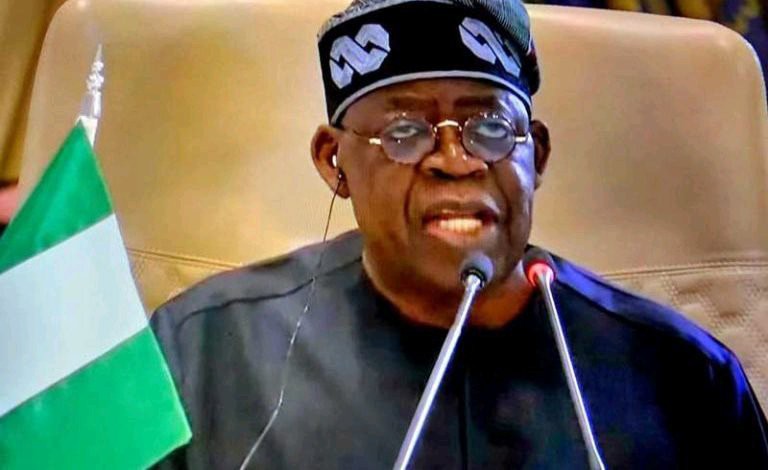President Bola Ahmed Tinubu has reaffirmed his administration’s dedication to the welfare, development, and protection of Nigerian children.
This pledge was made on Tuesday, May 27, 2025, as the nation marked this year’s National Children’s Day with the theme, “Stand Up, Speak Up: Building a Bullying-Free Generation.”
According to a report by Diaspora Digital Media (DDM), the President described children as the heartbeat of Nigeria’s tomorrow and the custodians of innovation and leadership.
Tinubu expressed deep joy in celebrating the occasion with children nationwide, stressing that the government bears both a constitutional and moral responsibility to protect them.
He called on Nigerians to ensure that children feel safe, respected, and heard in all environments—both online and offline.
The President condemned all forms of bullying and violence against children, stating such actions are incompatible with Nigeria’s vision for the future.
He cited global statistics that over one in three children suffer bullying, with studies in Nigeria showing 65% of schoolchildren have experienced physical or emotional aggression.
Calling this situation unacceptable, Tinubu stated that no child should live or learn in fear.
The President highlighted key elements of his Renewed Hope Agenda, which prioritizes child protection through coordinated national frameworks.
He announced the full implementation of the National Plan of Action on Ending Violence Against Children (2024–2030), describing it as a comprehensive strategy for prevention, accountability, and victim support.
Tinubu revealed that the government is reviewing the Child Rights Act (2003) and Violence Against Persons (Prohibition) Act (2015) to close loopholes and enhance nationwide enforcement.
He also mentioned the Cybercrime Act, which is being deployed to combat cyberbullying and digital exploitation of children.
The President noted that all 36 states have now domesticated the Child Rights Act, but warned that legislation alone cannot protect children.
He called for collective responsibility involving parents, teachers, religious leaders, lawmakers, and all citizens in safeguarding children’s rights.
Tinubu announced the scaling up of the Child Protection Information Management System (CPIMS) to monitor and respond to violations in real-time.
He added that the Ministry of Women’s Affairs is leading nationwide campaigns and strengthening community-based protection mechanisms.
The President revealed plans to establish a robust institutional framework dedicated to child protection, ensuring greater accountability and service delivery.
He said new policies like the National Policy on Safety, Security, and Violence-Free Schools have been introduced, along with training guides for school administrators.
He stated that social-emotional learning and child protection are now embedded in teacher training modules nationwide.
Efforts to reduce the number of out-of-school children continue under the National Commission for Almajiri and Out-of-School Children, according to Tinubu.
Healthcare access for children is also receiving attention, with expanded services across all six geopolitical zones through Mother and Child Hospitals.
He mentioned collaborations with subnational governments to establish similar health facilities across states.
Tinubu also launched the National Guidelines for Alternative Care for Children, to ensure children without family support receive proper care.
This complements the action plan on ending violence against children and strengthens Nigeria’s child protection system.
On nutrition, Tinubu highlighted the Nutrition 774 project and the School Feeding Scheme, designed to combat hunger and enhance academic performance.
He announced the formation of a Department of Nutrition within the Federal Ministry of Women’s Affairs to coordinate policy and implementation.
Other initiatives include social protection tools such as the Universal Child Grant and the development of a National Child Wellbeing Index to track progress.
To improve community involvement, Tinubu launched a national “See Something, Say Something, Do Something” campaign to empower citizens as child protection advocates.
He urged every Nigerian to speak up when children are in danger and stressed that children’s voices must be heard and respected.
“Your dreams matter. Your voices matter,” he said in a direct message to children, assuring them of protection if they face harm or abuse.
He commended states that have made meaningful investments in child welfare and urged those lagging to act swiftly.
“Children are not statistics,” the President declared, “they are the soul of this nation.”
He closed his speech by encouraging all stakeholders to embed child rights in their budgets, policies, and national planning strategies.
The President urged for a Nigeria where no child suffers in silence or is left behind, and where every child thrives in peace and dignity.
He congratulated Nigerian children and expressed hope that their laughter will echo across the land as a symbol of renewed national promise.
“Long live Nigerian children,” Tinubu concluded.
“Long live the Federal Republic of Nigeria.”



